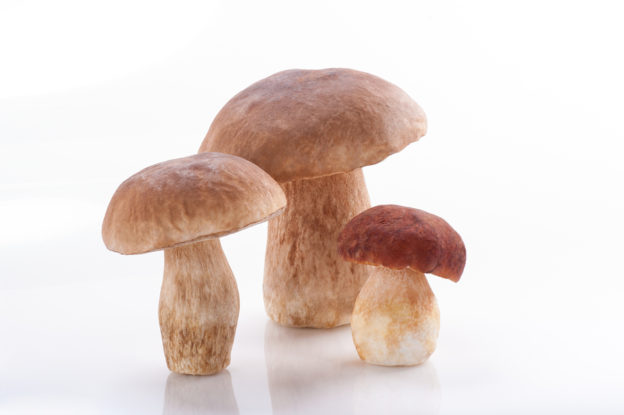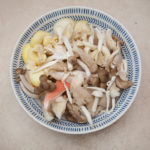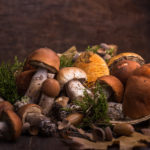By David Blyweiss, M.D., Advanced Natural Wellness
October 14, 2016
- Are mushrooms the new superfood?
- Lowly mushroom packs a powerful punch
- The incredible medicinal mushroom
If you’re like me, you enjoy the flavor and texture of mushrooms. But you may not realize that they have super-powers.
That’s right. The lowly mushroom is a superfood. In general, mushrooms have a higher protein content than many vegetables. Multiple studies on edible mushrooms have revealed some incredible biological activities including antitumor and anticarcinogenic effects.
Also mushrooms contain a number of secondary metabolites, including various phenolic compounds, which have been shown to act as excellent antioxidants and now a recently discovered one that I’m very excited about.
It’s an amino acid called ergothioneine, or “ergo”. This compound is so powerful that it deserves vitamin status. However, it’s very scarce in our food supply. You’ll find very small quantities of it in only a few foods; like kidney, liver and beans.
But when it comes to mushrooms, it’s an entirely different story.
They are, by far, the most abundant source of ergo in our food supply. In fact, some types of mushrooms can contain concentrations up to 40 times higher than the second best food source of it.
So every time I savor a few stuffed mushrooms or a grilled Portobello, I’m getting a hefty dose of this highly absorbable nutrient. And it goes to work immediately to improve my health.
MD Exposes the Hidden Danger to Your Eyes

When your eyesight starts to fail, it's a real problem. Suddenly you can't go to the grocery store... you can't get to the doctor if you have an emergency... you can't meet your friends for dinner…
Your "regular" doctor doesn't have time to keep up with the latest research. And the same goes for eye doctors. They go to school to learn how to fit you for glasses and contacts, but have no way of preventing the damage and loss of eyesight that threatens your freedom and independence.
Let me show you something that explains a LOT about how your eyes work.
In my FREE Special Report, I'll show you a HUGE, untapped resource for your eyes that safely and naturally restores clear, effortless eyesight.
Click here to get started...
Here’s what happens when you regularly eat ergothioneine-rich mushrooms…
Lowly Mushroom Packs a Powerful Punch
Eating mushrooms for just 16 weeks can double your levels of ergo.
This, in turn, can lower markers of inflammation and reduce oxidative stress. It may also increase your levels of something called adiponectin.
Low levels of this substance are linked to excess weight, insulin resistance and high triglycerides. So raising levels of adiponectin by eating mushrooms can help offset all of these issues.
Adding mushrooms to your diet can also help keep your blood sugar in balance. They significantly decrease glucose response, which can aid in weight loss and improve exercise stamina.
Another way mushrooms can boost your health is by lowering your intake of red meat and salty foods.
It may sound odd, but mushrooms boost satiety when eaten with red meat, so you end up eating less of it. That’s because meat and mushrooms both satisfy the same savory taste-sensors that you’re hardwired with.
Mushrooms also seem to improve the flavor of low-salt foods. Thus, when you blend mushrooms with red meats and low salt foods, you can enjoy a healthier meal without compromising taste.
These are just the highlights. Getting more mushrooms in your diet every day may also protect against DNA damage, improve arterial function, boost immune response and help increase vitamin D levels. They also enhance the quality of your gut microbiota.
All of these health effects can go a long way when it comes to staying hale and hearty as you age.
The World's Quickest Solution for Ending Prostate and Urinary Misery
This has recently been revealed to be one of the only real breakthroughs in prostate health.
The seeds of a strange fruit (sometimes called "Chinese Apples") hold powerful phytonutrients that are a revolution in prostate health.
In fact, UCLA and Veterans Administration research have now proved this to be true.
Not only that, but it may be the worlds quickest solution for ending prostate misery.
Simply stated, these phytonutrients represent a huge step beyond beta sitosterol, saw palmetto, and other phytosterols alone.
Simply click HERE if you want to have fast prostate relief...restful, uninterrupted sleep...no more constant "urges to go"...enhanced virility...and optimal prostate support for life.
The Incredible Edible Medicinal Mushroom
It’s a shame that so many folks only eat mushrooms on top of pizza, cheeseburgers or Philly cheese steak sandwiches when there are so many other ways to enjoy them.
I’ll take them any way I can get them…. grilled, stuffed, baked, broiled or marinated. I also like mushroom soup, mushroom stir-fries, in my eggs and mushroom tomato sauce.
So it’s not like there is a shortage of ways to enjoy the medicinal mushroom.
Among the most commonly consumed mushrooms, portabellas and criminis have the highest ergothioneine content, followed closely by white buttons.
But for real muscle-power, go for the exotics. Shiitake, oyster and maitake are the most potent. They can contain up to 13 mg. of ergo in a three ounce serving.
If you’re anti-fungi – as some people are – you can always look for an ergothioneine supplement.
And by the way… don’t forget to buy organic!
SOURCES:
Chihara G, Himuri J, Maeda YY, Arai Y, Fukuoka F. Fractionation and purification of the polysaccharides with marked antitumor activity, especially lentinan, from Lentinus edodes (Berk.) Sing. (an edible mushroom) Cancer Res. 1970;30:2776–2781.
Lee IS, Nishizawa A. Polyozellus multiplex, a Korean wild mushroom, as a potent chemopreventive agent against stomach cancer. Life Sci. 2003;73:3225–3234.
Cheung LM, Cheung PCK, Ooi VEC. Antioxidant activity and total phenolics of edible mushroom extracts. Food Chem. 2003;81:249–255
Pinheiro F, Faria R, de Camargo JLV, Spinardi-Barbisan ALT, da Eira AF, Barbisan LF. Chemoprevention of preneoplastic liver foci development by dietary mushroomAgaricus blazei Murrill in the rat. Food Chem Toxicol. 2003;41:1543–1550. [
Fu HY, Shieh DE. Antioxidant and free radical scavenging activities of edible mushrooms. J Food Lipids. 2002;9:35–46.
Mau JL, Lin HC, Song SF. Antioxidant properties of several specialty mushrooms.Food Res Int. 2002;35:519–526.
Penn State. “New Method Shows Mushrooms A Top Source For One Antioxidant.” ScienceDaily. Sept 2015.
Calvo MS, et al. A Retrospective Study in Adults with Metabolic Syndrome: Diabetic Risk Factor Response to Daily Consumption of Agaricus bisporus (White Button Mushrooms). Plant Foods Hum Nutr. 2016 Sep;71(3):245-51.
Kishida K, et al. Relationships between circulating adiponectin levels and fat distribution in obese subjects. J Atheroscler Thromb. 2011;18(7):592-5.
Lu HL, et al. Roles of adipocyte derived hormone adiponectin and resistin in insulin resistance of type 2 diabetes. World J Gastroenterol. 2006 Mar 21;12(11):1747-51.
Lara-Castro C, et al. Adiponectin and the metabolic syndrome: mechanisms mediating risk for metabolic and cardiovascular disease. Curr Opin Lipidol. 2007 Jun;18(3):263-70.
Study finds new health benefit from eating mushrooms. News Release. University of Buffalo. May 2014.
Feeney MJ, et al. Mushrooms and Health Summit proceedings. J Nutr. 2014 Jul;144(7):1128S-36S.







